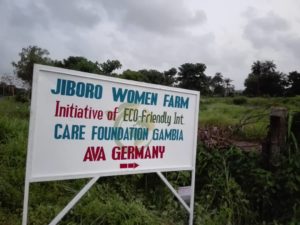
PROJECT TYPE: Organic Food production farm
PROJECT PARTNERS: ECO Friendly International, CARE Foundation and Agar Vision Africa Agricultural Initiative
PROJECT LOCATION: Jeborokunta, Kombo East, The Gambia
PROJECT COMMUNITY COUNT: 7500 Inhabitants
PROJECTED TARGET: 38,000 people
Madinaba population 10,000
Tubakuta population 6.000
Basori population 8, 000
Gida population 6, 500
Jiboro population 7,500
PROJECT FARMING AREA: 10,000 sqm
PROJECT WORKING PRINCIPLES
This project is initiated to work on the fundamental principles of health, principles of ecology, principles of fairness and principle of care.
1. Principles of Health
As Organic Agriculture works towards keeping the health of soil, plant, animal, human and the world as a whole together. This project would foster to connect the people of community with their abundant resources as it production high quality food products along the value chain to maintain the stability of the ecosystem.
2. Principles of Ecology
In Organic food production, the living ecological systems are position to work in cycles. The project would teach the community how to work with their ecological systems, copy them and keep them in right standing. This would create a balance in the ecological system as reuse of resources across the value chain is embedding in the bedrock of the community.
3. Principles of Fairness
Building on food system that brings about fairness with regards to the common environment and livelihood of the people of the community. As Fairness is measured by respect, even-handedness, impartiality and ownership of the shared investments among people of the community. The whole value chain of the organic food chain dwells on the understanding of ensuring fairness at all levels between all actors in the value chain.
4. Principles of Care
In Organic Agriculture, the care taken in providing for today should be fashioned in a way to maintain the health of the people and the environment of today, tomorrow and forever.
PROJECT AIMS
• To provide healthy and high-quality food for the community and its environs,
• To maintain the ECO system of the community,
• To train the youths of the community so that they would be self-reliant,
• To make the community an organic food production role model and
• To the further development of the community.

Leave a Reply